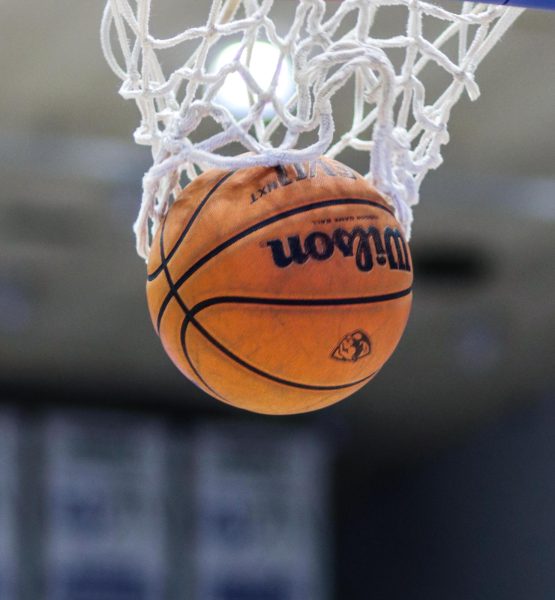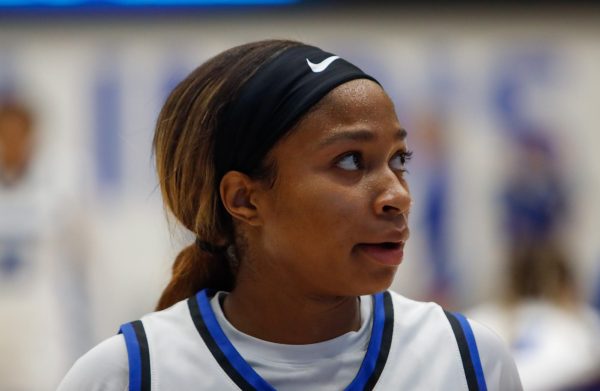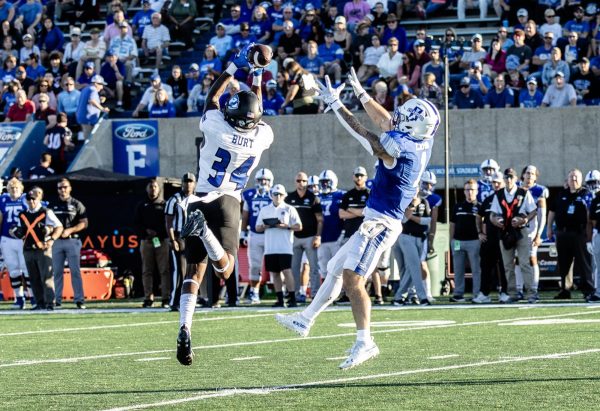Tennis team has international flavor
Adjusting to college life is something every Eastern student has to do. Students have to adjust to living on their own and meeting new friends.
But unlike the majority of the campus, some of the members of the men’s and women’s tennis teams have to adjust to not only the college life, but to an entirely new country.
Junior Chuck LeVaque competes at No. 1 singles for the men and has been one of Eastern’s most consistent competitors throughout his career. He made his journey to Charleston from the ski resort town of Mont Tremblant, Canada.
“My hometown has beautiful mountains, and a lot of Canadian Winter Olympians train there, but I was the only tennis player,” said LeVaque. “When I was 13 years old I moved an hour away to Montreal to train because there were no facilities for me back home.”
The level of tennis competition in Canada is not very good, LeVaque said, so he sought out the help of the Canadian Tennis Federation to try and find a scholarship to an American university.
“I had a list of about 50 universities where I was in contact with the coaches,” he said. “I was being recruited late in the summer so most of the schools were only offering me partial scholarships.”
The lack of scholarship money of other schools was Eastern’s gain. LeVaque scheduled a recruiting visit during the summer of 2003.
“I took a recruiting visit here in June and I really liked it,” LeVaque said. “I got to meet some of the other players and I really liked the small, compact campus. A week after my visit, my parents and I decided that Eastern was the best place for me and I signed and came here in August.”
Having just more than a 13-hour drive to get home, LeVaque only goes home for winter break and during the summer. That is fine with him because he has bonded so well with his teammates since first enrolling at Eastern.
“I had no clue what U.S. colleges were like so I did not know what to expect,” he said. “I stuck with the tennis team and we all became really close.”
While the Canadian Tennis Federation helped LeVaque find his way to Eastern, junior No. 2 singles player Madina Mambetova took a less formal route.
Mambetova, a native of Chegem, Russia, grew up playing tennis with her brother Alim.
Through a connection with a coach, Alim signed a scholarship offer at the University of Illinois-Springfield and that move would ultimately put Mambetova on a course that led her to Charleston.
After her brother put in a good word for her with former Eastern head coach Brian Holzgrafe, a graduate of Illinois-Springfield himself, she was contacted about coming and playing for the Panthers.
“I never had a recruiting visit so I didn’t really know what to expect when I first came,” Mambetova said. “I think I might have talked to (coach Holzgrafe) once, but I did email him.
“Charleston is a lot like my hometown so it had a familiar feeling. From the start I got along real well with the other girls on the team. I also made lots of friends with the other girls on my floor (in the dorms). It has been easy to meet people, everyone has been so nice.”
While LeVaque and Mambetova were interested in coming to the United States, sophomore Sandra Sasidharan was reluctant at first.
“I was given some other offers before Eastern’s but I was hesitant then because I didn’t want to leave home,” said the Panthers’ No. 1 singles player. “I was playing tennis in India but then I eventually decided that I wanted to take the next step and see what would happen.”
Sasidharan grew up in Chennai, India, and was discovered just like Mambetova was. A friend was playing tennis for Tennessee-Martin and started spreading the word about the talented Sasidharan. Other than a few other small schools, Holzgrafe was the only one to try and get in contact with her.
“He called me and that really got the process going,” Sasidharan said about her recruiting process. “I did some research about Eastern from the website and I learned about the team from coach Holzgrafe and from my friend. I had already started taking business classes at college in India and I saw that Eastern had a good business program. The business school along with a quality team really made me want to come (to Eastern).”
Sasidharan, however, did not have the smooth transition that Mambetova and LeVaque experienced.
The sophomore was a week late getting to Eastern and missed out on freshman orientation. This only amplified the anxious feeling Sasidharan had about coming to a new country.
“It was really exciting to be coming here and experiencing a new country and new ways of doing things but I did not have any relatives here,” she said. “I was here by myself with my only connection being the coach who I had talked to on the phone.”
The staff and other players stepped in, though, and tried to get Sasidharan acquainted to the campus as quickly as possible.
“The assistant coach (C.J. Weber) was taking me everywhere and showing me the campus,” Sasidharan said. “Madina really helped me because she had gone through everything already and she made me feel comfortable.
“I didn’t see the team as people from different countries, but a group that I wanted to become a part of. I didn’t know what to think of everyone and I didn’t know what they thought about me, but everyone was really nice and they took me in.”
First-year head coach John Blackburn continued the trend of recruiting internationally that Holzgrafe started.
Freshman Vuk Milicevic came to Eastern by way of South Africa but that is not his birthplace. Milicevic was born in Yugoslavia but when he was 5 years old, political turmoil and war forced his family to leave.
“With all the war, Yugoslavia was not a good place to raise a family,” Milicevic said. “My family wanted to move and South Africa was one of the few places taking in Yugoslavians at that time.”
Milicevic settled into Pretoria, the capital of South Africa with a population just more than 2 million. He attended high school at the Tucks Sports Study Centre, where the best athletes in all sports from South Africa gather to train and study together.
His coach at Tucks had a connection with at the University of Illinois and through that contact Milicevic was pointed to Eastern. He began talking with ex-assistant coach Weber after Holzgrafe had left and before Blackburn was hired in June. The thought of not having a head coach in place did not bother Milicevic.
“I was really excited to see what the new coach would be like,” he said. “Everyone seemed to be excited about his arrival and I was interested to see what his goals were for the season.”
Like LeVaque and Mambetova, Milicevic had a nice experience coming to Eastern.
“It was much easier adapting here than I thought it would be,” Milicevic said. “Everyone was so much nicer than back home and everyone was really friendly.”
Milicevic made the transition to the team well too, as he is already competing at No. 2 singles just behind LeVaque.
Holzgrafe thinks the Panthers are fortunate to have the players he recruited.
“I got a lot of flack from the administration because they wanted me to stay with local kids to save money,” Holzgrafe said. “I got so lucky that they were all 4.0 students and phenomenal tennis players. Eastern is very lucky to have them.”





































































